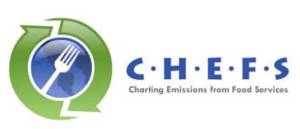 By Tim Ryder, Clean Air-Cool Planet Climate Fellow
By Tim Ryder, Clean Air-Cool Planet Climate Fellow
Food is fundamental, and as one of the few daily activities which connects people across the world it is mind boggling that we have become so far removed from it. One of my favorite quotes from Roger here in Clean Air-Cool Planet’s Portsmouth office is, “you can’t manage what you don’t track” and I have taken this quote to heart with my project this summer.
My fellowship with Clean Air-Cool Planet focused on a new tool, which is on its way to being released, named CHEFS or CHarting Emissions from Food Services. This  program has university faculty, professors and students input food purchasing data; outputs the total carbon emissions; and breaks it down further by stage (agricultural versus processing), ingredient (coffee versus beef) and gas-type (N2O versus CO2) in both graph and list form. This data can be manipulated in “what-if” scenarios in order to provide the head chef with a tool to maximize the efficiency of their menu.
program has university faculty, professors and students input food purchasing data; outputs the total carbon emissions; and breaks it down further by stage (agricultural versus processing), ingredient (coffee versus beef) and gas-type (N2O versus CO2) in both graph and list form. This data can be manipulated in “what-if” scenarios in order to provide the head chef with a tool to maximize the efficiency of their menu.
Thus, my job this summer was to help increase the amount of data in the tool to the point where Universities could utilize it and then do something meaningful with that data. The first step was getting all the data in the standalone CHEFS program into the new online version. We were on a tight schedule as the second round of CHEFS pilot schools was almost done compiling their data and would soon need to enter it online. Though it took a week of hard work, I have brought the CHEFS tool up to more than 70 items!
With CHEFS functional, I was able to shift my focus to more qualitative endeavors such as a best practice list. This list was my first goal and I began by doing research into what our current pilot schools were doing and ultimately what initiatives the leading institutions of the nation were engaged in. I compiled these together including case study links to institutions which had a particularly spectacular program as a resource for those universities which were just starting a program. I also included some qualitative data in order to show the amazing potential of certain programs such as trayless or composting!
The best practice list prompted me to create a LinkedIn group which I named “Sustainability in Dining Services” that now has 60+ members from a wide variety of institutions. Hopefully this will become an area for discourse on the subject over the coming years. I am also working on making the document into an online expandable webpage in order to allow for easier access.
The next project on my plate was working on purchasing a large database to supplement the data we already had in the tool. While this is still underway it does look promising and I am hopeful that within a few months this database will increase the number of items in the tool by tenfold!
One of the biggest projects I have worked on this summer is the creation of a qualitative labeling system. The goal is that this system will bridge the gap between the dining service professionals and the student consumers. It is a system which uses graphics and colors to represent the amount of carbon emitted to create that product and the production method – such as organic.
At first my designs were very detailed with lots of colors but have gotten simpler and more refined as the weeks have gone by. This is thanks to a lot of design consultations from my friend Jason, a fellow Stetson graduate, and the people at ARAMARK. What I have now are three great designs which will go through focus group review and hopefully provide some very useful feedback. Hopefully this system will also be tested in some of the pilot schools’ dining halls so if you’re a student keep your eyes out for some beautiful looking carbon labels!!
Overall this summer has been an amazing experience. The discussions I had every day with my fellow Fellows were stimulating and fascinating and I learned more than I could have imagined from Roger and Jennifer. There is no doubt, my communications skills have grown leaps and bounds this summer and I feel much more prepared to spend the next semester in Washington D.C. at American University’s Washington Semester – International Environment and Development Program!
